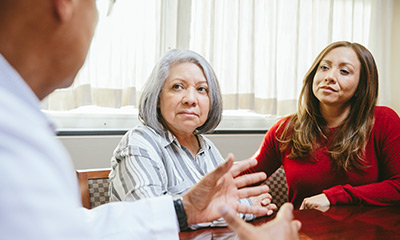Hispanic Americans and Alzheimer's
Approximately 13% of Hispanics who are 65 or older have Alzheimer's or another dementia. Learn what the Alzheimer's Association is doing to address health disparities and provide support for Hispanic community members living with Alzheimer's or another dementia.
Quick facts
Like other demographic groups, Hispanic Americans have a variety of backgrounds, races, ethnicities and experiences. If you are a health care or services provider, advocate or otherwise serve people living with Alzheimer's or their families, there is no substitute for engaging local voices to learn what your community needs and how to meet those needs.While Hispanics are 1.5 times more likely than Whites to have dementia, more research is needed to understand why.
One-third of Hispanic Americans (33%) report that they have experienced discrimination when seeking health care.
Almost 9 out of 10 Hispanics (85%) say it is important for Alzheimer’s and dementia care providers to understand their ethnic or racial background and experiences.
Almost 6 in 10 (57%) believe that a significant loss of memory or cognitive abilities is a normal part of aging.
Help is available
If you or someone you know has been diagnosed with Alzheimer's or another dementia, you are not alone. The Alzheimer's Association is the trusted resource for reliable information, education, referral and support to millions of people affected by the disease.- Call our free 24/7 Helpline: 800.272.3900. The Alzheimer’s Association is here all day, every day for people facing Alzheimer’s and other dementia. Talk to a dementia expert now and get confidential emotional support, local resources, crisis assistance and information in over 200 languages. It's ok if you don't know where to start. Just give us a call and we'll guide you from there.
- Locate your local Alzheimer's Association.
- Find a Spanish-language support group (PDF).
- Go to Alzheimer's Navigator to create customized action plans and connect with local support services.
- Support groups and discussions in Spanish on ALZconnected®.
The "Memories of My Grandfather" telenovela
Watch a virtual screening of "Memories of My Grandfather," a mini telenovela created to spark conversation around Alzheimer’s in Hispanic communities, followed by a panel discussion and Q&A with dementia experts.
Participate in the Alzheimer’s Association TrialMatch
Clinical trials are research studies conducted with human volunteers to determine whether treatments are safe and effective. Despite the benefits of participating in a clinical trial, Hispanic Americans are underrepresented in clinical trials. Engaging, recruiting and retaining diverse populations in Alzheimer’s research and clinical trials is essential to working toward better health equity. Participants who volunteer are supporting the development of treatments and gaining access to care and support from leading medical experts free of cost.Hispanics are underrepresented in clinical trials:
- Individuals are most willing to volunteer for a clinical trial if they are invited to participate (85%), want to contribute to the goal of research (83%) or have a family member with the disease (74%).
- African Americans, Latinos and American Indians are significantly more likely to volunteer if asked by a person of the same race, and are more concerned than White Americans about disruption of work and family responsibilities and availability of transportation and childcare.
- Commonly used Alzheimer’s clinical trial exclusion criteria have the potential to disproportionately affect African Americans and Hispanics/Latinos, which may play a role in their reduced enrollment in research.
Volunteer in your community
Music Moments with Luis Fonsi
Luis Fonsi, one of the leading Latin music artists of his time, shares his connection to the song "Girasoles" ("Sunflowers") with Alzheimer's Association Music Moments.
Volunteer stories
- Sonia Martinez, advocate and community educator: "I love seeing our hard work come to fruition." Read Sonia's story of advocacy, volunteerism and spreading awareness about Alzheimer's within the Hispanic/Latino community and beyond. English | en español
- Carlos Olivas III, Walk to End Alzheimer's committee member: "As an Alzheimer's caregiver, I am surrounded by other caregivers in communities of need who are also navigating the disease." Read Carlos' story of learning how to become a caregiver for his dad. English | en español
- Joe Arciniega, Alzheimer's Association board member: "[Losing my father] lit my activism." Joe is committed to advocating for legislation that advances Alzheimer's research and support. Read Joe's story in English.
Association partnerships
At the Alzheimer's Association, we believe that diverse perspectives are critical to achieving health equity — meaning that all communities have a fair and just opportunity for early diagnosis and access to risk reduction and quality care. The Association is committed to engaging underrepresented and underserved communities and responding with resources and education to address the disproportionate impact of Alzheimer’s and dementia.The Alzheimer's Association partners with many organizations to better serve all communities in the United States. Its partners in serving the Hispanic community include:
- The Mexican Consulate and their Ventanilla de Salud (VDS) program.
- National Association of Hispanic Nurses.
- National Hispanic Council on Aging.
- National Hispanic Medical Association. Read our profile of Dr. Elena Rios, CEO of the NHMA, and its work to reduce disparities.
